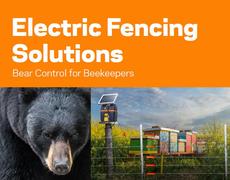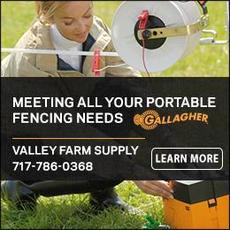One of the great advantages of hi-tensile fencing is its ability to remain tight over long distances and
rolling terrain. This inherent tautness of the wire allows post spacing to be much wider than with
conventional fence wire or soft electric fence wire. On level or evenly sloping terrain, line posts may
be up to 80-100 feet apart for a single wire paddock fence. Most More rolling terrain is not so
favorable and a 40 to 60 feet spacing is more realistic. In extremely rolling or rugged terrain, posts
may need to be even closer. Three wire sheep and goat fences require a closer spacing. Experience
has shown that 25 to 40 feet post spacing is appropriate in most situations for the smaller ruminants.
Posts must be rigid enough to support the weight of the wire and downward pull when passing over
hill crests and small rises. Any type of a post will work as long as a durable, reliable insulator or a
self-insulating post is used. Wood posts are still very commonly used at stress points in the fence
line such as ridge tops and ditch bottoms. A good quality insulator is essential at these points as hitensile
wire places significantly more strain on a plastic or porcelain insulators than will light gauge
electric fence wire or even barb wire.
We prefer to use the PowerFlex wood-plastic composite (WPC) post for most applications. These
self-insulating posts come in a variety of lengths and several diameters so a post can be found for
just about any situation.
The flexibility of these posts allows them to
stand up to heavy wildlife pressure while
remaining inn the ground and returning to an
upright position after animal impact. The
posts are textured rather than slick so they
tend to stay in the ground much better than
do fiberglass posts. We generally like to have
at least 15" of post in the ground.
The wire is attached to the post by means of
wire cotter-key inserted through a 3/16" hole
drilled through the post. Wrap the cotter key
ends around the neck of the eye, not around
the fence wire itself. This allows the wire to
move freely through the eye rather than being
held rigidly to the post. This is important for maintaining flexibility in the fence and allowing
expansion and contraction through the changing seasons.
Fiberglass is the second choice for line posts. For many years these were our first choice until the
PowerFlex post became available. Fiberglass is extremely durable and self-insulating. Fiberglass is
also available in many lengths and diameters. It is much heavier and more difficult to work with than
PowerFlex posts. On a permanent installation do not attempt to use only 3/8-inch fiber rod posts as
the fence will be very unstable and on uneven terrain will bend down towards the ground on high
spots. The least cost single-wire fence construction is usually the lightweight fiberglass posts used
in combination with either heavier gallagher, fiberglass, steel, or wood posts.
Most fiberglass posts tend to become rough over time with numerous splinters ready to aggravate
the hands. Used in permanent situations this problem is not too serious, but in temporary situations
can be quite a nuisance. A high-grade post should be selected. Typically the better grade fiberglass
posts have a glossy finish and are very smooth to the touch. A post that is rough in the store will
rapidly become much worse in the field. Plastic coated posts that are designed to minimize the
hazard of splintering are also available.
We do not encourage the use of steel T-posts for electric fencing. They are just a short waiting to
happen. If using steel T-posts, a very high quality, durable insulator is a must. Many plastic
insulators that are commonly available at farm-and-home stores are not UV stabilized and become
brittle with exposure to sunlight. Broken insulators on steel posts are a sure path to a shorted fence.
Select only UV stabilized high-density polyethylene or high-density polypropylene insulators for use
on steel T-posts. Some of the better steel post insulators claim to have a 20-year useful life
expectancy, but expect some breakage long before that time passes.
order online at www.gallagherelectricfencing.com





